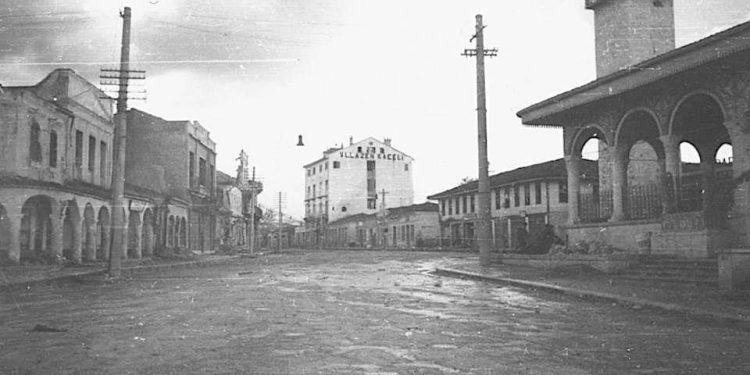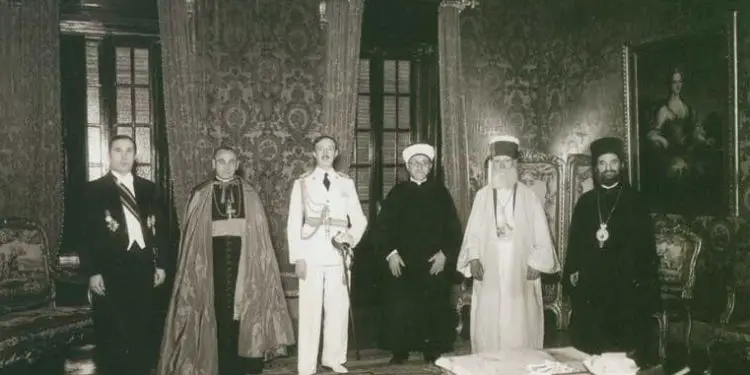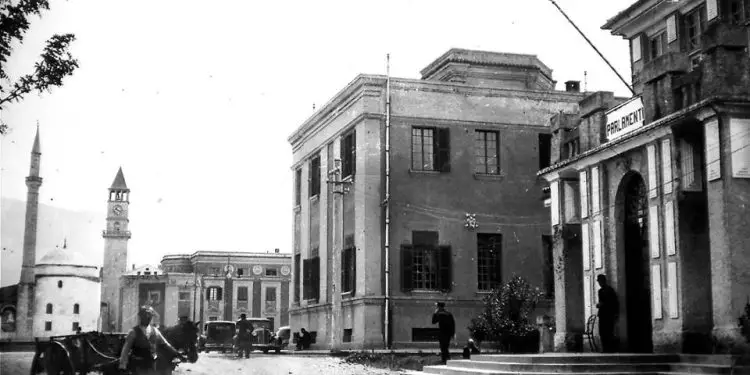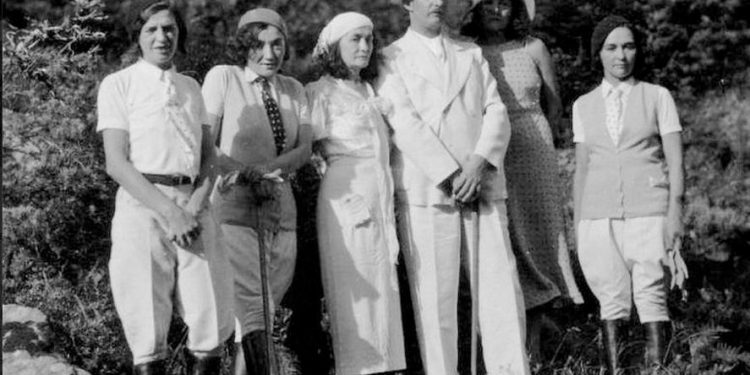By Sven Aurén
Translated by Adil N. Bicaku
Part ten
ORIENTI EUROPE
Land of Albania! Let me bend my eyes
On thee, thou rugged nurse of savage men.
Lord Byron.
In the book “Orient of Europe”, the author of the work is the Swede Sven Aurén. They are impressions of traveling from Albania from the ‘30s. His direct experiences without any retouching.
In a word, the translation of the book will bring to the Albanian reader, the original value of knowing that story that we have not known and we continue to know it, and now distorted by the interests of the moment.
Now a little about what these lines address to you: My name is Adil Bicaku. I have worked and lived for over 50 years in Sweden, without detaching for a moment, the thought and feeling from our Albania.
I am now retired and living with my wife and children, here in Stockholm. Having been for a long time, from the evolution of the Albanian language, which naturally happened during these decades, I am aware of the difficulties, not small, that I will face, to give the Albanian reader, the experiences of the original.
Therefore, I would be very grateful if we could find a practical way of cooperation together, to translate this book with multifaceted values.
Morally, I would feel very relieved, paying off part of the debt that all of us Albanians owe to our Albania, especially in these times that continue to be so turbulent.
With much respect
Adil Biçaku
Continued from the previous issue
The entertainment life in Tirana is modest, but it is not the weak economic reasons that give it this simple characteristic. It is modest, because the inhabitants of Tirana themselves, by nature, are modest people and almost do not covet more from life, than bread for the day, coffee, cigarettes, brandy and one or two, attending cafes or cinemas. Maybe a few trips back and forth, between families, so that’s all. Any life of restaurants in the continental sense has no meaning for them and the restaurateurs it has, functioned separately and only as places to eat. There is no nightlife at all, and Tirana is probably the only capital in Europe that does not know what a dance restaurant means.
The Albanian capital is much different from other Balkan centers. Regardless of size, a completely different atmosphere dominates in Zagreb, Belgrade and Sofia. In the Yugoslav and Bulgarian cities, he finds a hectic life of fun, expensive and vulgar together. Tirana is an oriental city on the transfer route, in a western one. But it still weighs on Orientalism. Each family is a closed unit, making a living for itself or having limited entry and exit with neighboring families. I have emphasized that Tirana is open in a circle shape, very large with a relatively visible western square, as a central point. On the outskirts of this district, find real residential homes. They carry traces of unitability. The facades of the houses are not up to the street, but are separated by high walls.
Can especially at night, give the impression of walking, among a pile of medieval castles. The citizen’s house is not a house in the ordinary sense, except for a castle intended to guarantee him, that isolation from the outside world, which he absolutely seeks. If you have once walked in these neighborhoods, so you understand why the evening of Tirana is not seduced by restaurant windows and jazz music. After eight o’clock in the evening, Tirana is with a few exceptions, almost a silent city, just as silent as a few hours ago before it roared, intense and stunning.
If you take the word fun, with its broad meaning, which summarizes everything, to offer you a welcome break from the tedious work of the day, then it should be logical in describing the fun life of Tirana, to start me cigarette. Tobacco apparently plays a bigger role in Albania than in any other European country. It is an extremely large part, which makes life worth living. The Albanian authorities know this, when they surprised the citizens to confront them, with the tobacco monopoly. Monopoly prices are extremely reasonable. They did not even dare to set different prices for different cigarettes.
There are many types of cigarettes, but they all cost the same: 25 cents, for 20 pieces. Tobacco traders have stacked the most beautiful boxes of cigarettes in the windows of shops. They are green, blue and white packages, some with standard European names, others with very Albanian names, and all are wonderful. Albanian tobacco is soft and pleasant, the authorities have high hopes for a future export, despite the very fierce competition from Greece, Bulgaria and Turkey has made what an important export, still could not start.
Tobacco is therefore one of the external characteristics of the Albanian. If he does not have a cigarette in his mouth, then he has put it in his ear. Tirana cafes are filled with the densest skies of tobacco smoke I have ever seen. You exchanged two words with a stranger; he immediately offers you a cigarette. Women smoke as much as men, but not in public when the headscarf and tradition prevent it. I have been able to ascertain this, from their smoky colored finger. But just like Italians and Albanians, they prefer cigarettes.
No cigars are produced at all. I’m just glad that cigar has not found any public here. It would be terrifying to see these Albanians dressed so beautifully, in coats with variegated embroidery and white scarves, to walk sucking in the black curiosity. It is enough with the half-closed tents, which they gladly hold in their hands and that there, poses a serious danger, against the Albanian romanticism. What would it be like for King Zog to order the removal of these dubious surrogates, instead of the already banned rifles?
King Zog exercises, as I have mentioned, one of the strictly necessary conditions of political dictatorship. Perhaps because of his position, he could have taken greater definitions of the freedoms of his subjects. But there are two things, which are absolute taboo: coffee and tobacco. He can raise taxes, extend his military service, and close all cafes in Tirana, if he wants. An assassination attempt against tobacco, let me say in the form of huge consumer price increase, would cause something terrible. I asked a cigarette seller what he thought, if there would be a result, a price increase of one ALL, for a pack of cigarettes. This kind man hesitated at first to answer this question. He thought I was making fun of him. But when I insisted, then he responded in a serious tone set with just one eloquent word: Revolution.
Rather he did not have to say. I have already heard the war cries, to be heard from Shkodra to Saranda and I saw the old fighters, roaring in the gorges and passages. Revolution, revolution…!
An unreasonable increase in the price of coffee would certainly bring the same risks, because in the life of Albanians, coffee plays at least the same role as cigarettes. Coffee is a symbol of peace and comfort, for generosity and culture. It is a means of pleasure and sacred character. You can be poor, like someone who deals with donkeys or rich like an Elbasan bey, you do not invite for a cup of coffee, the one who steps on the doorstep, and then you break the laws, the most fundamental of the province. It does not matter who it is, who comes inside. Whether he is a friend or an enemy, rich or poor, known or unknown, it is enough that he stands on your doorstep, he is your guest and asks you, your friendship.
Inviting for a cup of coffee is the first obligation in the world, much more important, than shaking hands or saying goodbye. Coffee starts friendship. First put the small cups in front and the sweet aroma, to tickle the nostrils pleasantly, then the conversation begins. This conversation can be extremely important. Perhaps it is treated to make a quick decision or to raise an urgent matter. The label is always rigid: first coffee, then issue.
At the beginning of my arrival in Albania, before I had not yet realized the importance of this coffee ceremony, I did not escape to notice, although quickly and secretly, but an irritation, to some persons of the official authorities, that I had contact. A Swede is accustomed to presenting his case immediately and without hesitation on a visit to the Chief of Police or a ministry official. This does not sound good in King Zog Monarchy. A meeting request of an employee to obtain information includes four important moments, the order of which does not change:
Introduction and some heartfelt words about time, wind, beauty of the city or place etc.
Drinking coffee.
Opening the conversation about the reason for the visit.
Rejection and another cup of coffee.
Some hours after my arrival in Tirana, I made according to the written agreement, before a visit to the Chief of Press, to the kind and polite Dr. Sherko, who is headquartered in the Interior Ministry building. After drinking coffee, Dr. accompanied me. Sherko, to his Excellency the Minister of Interior, where those four points mentioned above, resumed in the same forms of satisfaction. From the office of the Minister of Interior, the Ministers of Foreign Affairs, Finance, Culture and Justice, all sympathetic and cultured gentlemen, took me to their Excellencies, who in no way deviated from the traditional reception program.
The visits were quite short and by the time I got back to the hotel, I had left exactly, half an hour. I had then drank six cups of coffee, but later found that it had been really strange, that I had not reached with more cups during this time, as long as thirty minutes. Passing through the hotel, a surprise awaited me. At my desk in the room, there were five folded business cards. I read the names of all five ministers in turn.
This should be called the answer to modern tact. It is not just that, by itself, the pleasure and culture of the coffee label has gone into absurdity. Traders gladly rent coffee to customers, especially if it is foreign and therefore supposed to be in good economic condition, according to the Albanian meter. Because as for me and my lady, it was impossible to buy something, just small things, without drinking coffee with the seller. There were days, that I counted the cups of coffee and reached seventeen. Yes, this is a modest figure compared to what the residents of Tirana themselves achieve. Thirty-forty cups a day is by no means extraordinary. One day I asked the charming little waiter of the restaurant “Adriatik”: – Does not your stomach hurt from this great consumption of coffee? He looked at me, and asked: -Abdominal pain? I do not understand exactly this…! On this side of the issue, he had never reflected. No one reflects on that. This is fine as it is.
Now there are two circumstances, which are important to understand correctly this coffee, strange culture: the size of the cups and the extraordinary aroma of the coffee. Albanian coffee is a modified Turkish coffee. It is very fine, it is baked together with the sugar, in a small, strange copper pot and as soon as it starts to boil, it is emptied into the cup, which is a little smaller than a cup of ‘Moka’ coffee. After a few minutes the thick coffee falls to the bottom and on top of it a liquid, dark, which has a wonderful aroma.
But unlike the real Orientals, Albanians roast the coffee softer, compared to them. It is not as intense as e.g. Turkish, but tastes totally stimulating. Apparently this is the reason, which explains, stomach ailments are no longer common. For the one who likes to taste it, it becomes a passion. Despite the large number of cups of coffee, which we, willingly or unwillingly, chilled for each day, it became completely natural to order, one cup every one or every two hours. We drank, in fact, nothing but coffee and we had no harm from it.
In Sweden, coffee is usually characterized as the Swedish national drink. Then this is mainly in Albania, the national drink. I do not dare to think what would happen if Albania for one reason or another, was blocked from coffee imports. I suspect that possibly a foreign invader with the force of arms, to subdue the country. Of course it would be that god only as a name, but no more. To this point, history gives clear answers. But it would probably be achieved with an effective coffee blockade. The Albanian can endure persecution and oppression, poverty and hunger. Because he is very experienced. But without coffee? Only God knows how it would be done, without coffee!
“Nacional”, the larger of the two cinemas in Tirana, is full to the brim. Down on the floor, most of the people are sitting: just in front of a bunch of rogue boys, behind the old, but almost not so gentleman. Boil the rows of chairs with concern. People come and go, shout and greet by hand, visit each other, a wonderful pastime. You cannot do without a head without a cover. Above the white and black keys, a dark gray cloud waves through which, you see the numerous cigarette fires, like sparks. That smell, which rises slowly to the ceiling, is not pleasant. It does not just smell of tobacco and people. It also smells of garlic, but that smell is not typical Albanian. All over the Balkans, there are really dirty clouds, perceptible invisible, and the smell of garlic. But it is unbelievable, how man acclimatizes. For the first few days in the Balkans, one reacts abruptly. After a week, the garlic clouds are gone.
Up in the lodge we sit in the upper class, having a meal to pay a ALL for a ticket. Down there are the tickets, much cheaper. You sit there for fifty cents and even less, but in the “cup” of the rostrum, you have to pay for the privilege of social distinction that these chairs make up. In the nearby lodge, over ten officers are grouped, around a respectable general, in whose chest the cords of the royal adjutant are intertwined, like golden snakes. He is a handsome man even, with intelligent appearance and a little gray hair. When I want to light a cigarette and cannot find the lighter, he immediately leans forward and hands me a lighted match. When I respond with “Merci, excellence”, he leans over with a gentleman and smiles with maintained teeth. It is quite correct to use the title of excellence when you have reason to assume that the person in question belongs to the upper strata of society.
Later I learned to know this elegant general again: Leon di Gjilardi, a former Austro-Hungarian officer, who, due to the circumstances, entered the Albanian service and managed to become a powerful factor in Albanian politics. He was one of the King’s most chosen friends. A few years ago, in fact, everyone knew that there were conflicts between these two gentlemen, but a radical reconciliation was reached and thanks to the pleasant and cheerful behavior, Di Gjilardi, the proclaimed idol of the Royal Court of Tirana, became known. . In August 1935, just a few months after I came home from Albania, he was killed in the small town of Fier by a journalist. The murder was intended to signal a revolt attempt, which in fact was extinguished, from the beginning but its epilogue contained no less than 31 death sentences.
When the popular general was buried, Zog stood on the stairs and said his last goodbyes to his slain friend. Now at dinner this famous general leans back in his chair contentedly and his officers look as far left as right, to discover any checkers in the bar. But it is a futile effort. There is not even a woman, in this big cinema, full. The light goes out and the film sound camera starts. The first issue in the program is that of world success, which in Sweden, is shot under the name “Red Sultan” and the German artist Fritz Kortner, and plays the role of the complicated personality of Abdyl Hamid.
There he sees a frightened, sickly suspicious Sultan wandering around in his magnificent palace (which has nothing in common with Yildiz, the real corner) and weaving intrigue and well. He is an unfortunate ruler, strong and weak, at the same time. He is afraid of everything: states, individuals, dead objects. Albania is not a little afraid, this country, which has supplied it with the best soldiers and the most intelligent civil servants, but has rewarded their service with terror and persecution.
This certainly has its significance, to sit in a cinema in Tirana and watch this film, about a man and a country, which Albania wants to forget. Many of them, who are sitting and rolling their eyes, with their mouths open on the screen, have experienced the time when the red sultan, out of a sense of persecution, inspired punitive operations and made life difficult and insecure for each of the country’s citizens. But when I study the officers near me, I have the impression that almost none is interested in Kortners’s attempts to give a psychological explanation, of the Sultan’s harsh governmental measures.
They talk and laugh and offer each other cigarettes. But when the director introduces himself to the audience, the much-talked-about harem of Abdyl Hamid holds the pupils of his eyes frozen in his face. And when the ballet twists its beautiful legs, in the private theater of the Sultan’s Court, where the ruler is sitting, alone, in the first armchair, the spectators’ mouths are open and the figures are cast in iron. It seems to me that I see some jealousy in watching them. But of course it is an injustice, which is just the ‘Red Sultan’, in his place near the courtyard theater stage, equipped with big and strong binoculars…! Memorie.al















